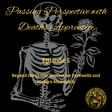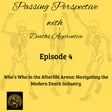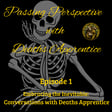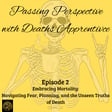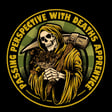Become a Creator today!Start creating today - Share your story with the world!
Start for free
00:00:00
00:00:01

Beyond the Grave: Exploring Our Fear and Fascination with Horror
Show Notes for “Passing Perspective with Death’s Apprentice”
Episode Theme:
Exploring the intricate relationship between society’s fear of death and its fascination with the horror genre.
Main Discussion Points:
Paradox of Fear and Fascination:
Analysis of society’s fear of death versus its attraction to horror media, including zombies and vampires.
Examination of cultural taboos surrounding death discussions contrasted with the popularity of horror content.
Historical vs. Modern Depictions:
Comparison of historical and modern portrayals of death in media.
Shift towards more realistic depictions and its societal implications.
Horror as Emotional Processing:
Exploration of horror’s connection to personal fears, particularly through true crime and works by authors like Stephen King.
Discussion on how fear can be beneficial for confronting anxieties about death and grief.
Genre Popularity and Audience Reaction:
Analysis of horror’s divided reception, similar to extreme sports in providing adrenaline and anxiety.
The role of horror in trauma processing and emotional exploration.
Symbolism in Horror:
Interpretation of monsters like zombies and vampires as symbols for deeper fears related to death, change, and loss.
Discussion on how horror encourages reflection on themes of loss and grief.
Future Discussions:
Teaser on practical steps to take when someone dies, highlighting the importance of contacting emergency services, funeral homes, or hospice care.
Reflection on life after death and an invitation for audience engagement on the topic.
Engage with Us:
Listeners are encouraged to share their thoughts and experiences related to the themes discussed in this episode, particularly around the impact of life after death.
Music from #Uppbeat
https://uppbeat.io/t/the-wayward-hearts/a-calm-hellfire
License code: TOEJOJDEKNY4JPIU
Transcript
Introduction and Trigger Warning
00:00:06
Speaker
Thank you for listening to Passing Perspective with Death's Apprentice.
00:00:10
Speaker
Being that this is a podcast about death, dying, and grief, some topics discussed may be triggering for some or not suitable for younger listeners, hence the explicit rating.
00:00:24
Speaker
Listener discretion is advised.
00:00:28
Speaker
Enjoy the show.
00:00:37
Speaker
Thank you.
Zombie Outbreak and Horror Themes
00:00:46
Speaker
Welcome back to Passing Perspective.
00:00:49
Speaker
I am your hostess with the mostest.
00:00:51
Speaker
Questions?
00:00:53
Speaker
Desapprentice.
00:00:55
Speaker
Last week, we ended the episode with a question about whether a zombie outbreak could ever become a reality.
00:01:04
Speaker
The answer was resoundingly probably not.
00:01:08
Speaker
But the question was definitely a tie-in for this week's episode.
00:01:12
Speaker
Everything has a purpose.
00:01:14
Speaker
I touched a bit on what it is about zombies that we fear and a little on the theme itself.
00:01:19
Speaker
This week we are talking all about the horror genre and basically death in the media overall.
Cultural Fascination with Death
00:01:27
Speaker
I'm sure you're asking yourself what that has to do with anything related to the death industry, but bear with me.
00:01:34
Speaker
I promise it does.
00:01:36
Speaker
In the first episode, my question was, why are we afraid of death and what makes one more prone to fear it?
00:01:43
Speaker
The horror genre, in both literature and media, is a popular one, and it is all about death.
00:01:50
Speaker
Whether it is zombies, vampires, werewolves, ghosts, or whatever scary concept the human brain can come up with.
00:01:59
Speaker
And there are lots.
00:02:00
Speaker
The main focus is seemingly death.
00:02:04
Speaker
Combine that with sensationalized news that seems to be non-stop death and war and even with video games we play.
00:02:15
Speaker
Death is a huge part of our culture.
00:02:18
Speaker
Why is horror and death such a huge seller in media when as a culture we are afraid of death and consider talking about it to be taboo?
00:02:29
Speaker
This week, we are going to go into why we humans love death across all forms of media.
00:02:38
Speaker
But do we love it?
00:02:39
Speaker
I don't know.
00:02:40
Speaker
What is our attraction to reading it, viewing it, and playing it, and watching it on the news?
00:02:48
Speaker
What does it all really mean?
Evolution of Death in Media
00:03:23
Speaker
So why are we obsessed with horror and death across all the media formats?
00:03:31
Speaker
Death is all over the place.
00:03:33
Speaker
It's everywhere we turn.
00:03:35
Speaker
Sometimes, whether we want to see it or not.
00:03:39
Speaker
We see it all over the news, and what we see now is drastically different than what was being shown even 30 years ago.
00:03:51
Speaker
What changed for us that we are more accepting of the more vivid portrayals of death?
00:03:58
Speaker
Not just with what we see on the news, but like in video games and movies and TV shows.
00:04:07
Speaker
I loved the old horror movies before CGI and technology because it was campy.
00:04:14
Speaker
Because you could tell it was fake.
00:04:16
Speaker
It was scary, but not that scary.
00:04:19
Speaker
It was lacking a realness to it that doesn't compare with what we see today.
00:04:24
Speaker
The part I liked the most was the unrealness of it.
00:04:29
Speaker
These days it doesn't even have to be a horror movie to depict realistic death.
00:04:34
Speaker
Most action movies are full of it.
00:04:37
Speaker
We stay glued to our news stations when disaster and war strikes taking in every image of destruction.
00:04:45
Speaker
We play games where we realistically simulate war and shooting and unlike real life, you can just respond when you make a mistake and start over again.
00:04:59
Speaker
The old saying goes and I think this is it.
00:05:02
Speaker
Art imitates life, life imitates art, something like that.
00:05:06
Speaker
But which case is true, I think there is a difference in disconnect between horror in literature and horror in media.
00:05:15
Speaker
Each are the same in some ways, but vastly different in others.
00:05:19
Speaker
And I wouldn't be doing this topic justice if I didn't speak on them both separately and together.
True Crime and Fear Exploration
00:05:26
Speaker
I mentioned finding death everywhere, including action movies, right?
00:05:32
Speaker
But what are the genres, both in literature and in media, that depict these deaths?
00:05:40
Speaker
A big one lately is true crime.
00:05:43
Speaker
I have seen this absolutely blow up recently.
00:05:49
Speaker
I have always loved true crime.
00:05:50
Speaker
This harkens back to the days of watching unsolved mysteries, alone late at night, and being terrified of every sound I heard.
00:06:00
Speaker
Could that mysterious killer be outside my house right now to get me?
00:06:06
Speaker
They never did find that kid, right?
00:06:09
Speaker
I remember having the same reaction to complete fiction, though, when I read Salem's Lot.
00:06:14
Speaker
If you're listening, by the way, Stephen King, it is still the scariest book I have ever read, so kudos.
00:06:22
Speaker
I think, in a way, these young experiences with healthy fear really led to me exploring writing my fears and anxieties into stories that helped me make sense of them.
00:06:37
Speaker
Can a little fear be healthy?
00:06:38
Speaker
Internet search says yes and no.
00:06:42
Speaker
It is a natural instinct.
00:06:44
Speaker
Fear and anxiety are naturally occurring.
00:06:47
Speaker
However, too much fear and anxiety lead to other issues.
00:06:51
Speaker
Some studies, however, are showing that people enjoy the genre of horror for many reasons.
00:06:58
Speaker
And one being working out our own fears of death and dying, and it helps us work through grief.
Psychology Behind Horror Consumption
00:07:05
Speaker
And what about true crime and mysteries, even sci-fi or that crazy show Fear Factor?
00:07:12
Speaker
And all the deaths in reality, are those really ways that we work through our own crap?
00:07:17
Speaker
What about the deaths in action movies and video games?
00:07:21
Speaker
Do those count as well?
00:07:23
Speaker
Before I get into the psychology of horror and death, I want to go a little bit into how it all began.
00:07:32
Speaker
Picture this.
00:07:33
Speaker
Just kidding.
00:07:33
Speaker
Horror as a literature genre began in the late 1700s.
00:07:40
Speaker
I guess officially.
00:07:42
Speaker
And in movies, it was the early 1800s.
00:07:47
Speaker
So within like a 20 to 30 year time span, give or take, it was a genre built on a curiosity of death.
00:07:56
Speaker
At this point in history, the world was in a huge political upheaval.
00:08:02
Speaker
There was so much going on and it was revolutions aplenty.
00:08:08
Speaker
People were seeing death head on and even actively participating.
00:08:13
Speaker
They were witnessing the monarchy be publicly beheaded in France.
00:08:18
Speaker
In fact, the whole spectacle was made out of it.
00:08:21
Speaker
Like, people were celebrating.
00:08:24
Speaker
As Charles Dickens put it in his opening line of A Tale of Two Cities, it was the best of times, it was the worst of times.
00:08:33
Speaker
Not just France was having a revolution, so was America.
00:08:39
Speaker
The American Revolution was happening roughly around the same time, and while all that was going on within that short time span,
00:08:46
Speaker
The industrial revolution was happening and just beginning and all of America and Europe were rapidly changing.
00:08:55
Speaker
Everything about life was changing.
00:08:58
Speaker
Views on death were changing as well.
00:08:59
Speaker
And it makes sense that this is the time.
00:09:03
Speaker
horror genre began.
00:09:05
Speaker
People were trying to make sense of a rapidly changing world.
00:09:10
Speaker
Looking into the relationships and research into death and horror, I came across a few statistics.
00:09:17
Speaker
And statistically speaking, the most preferred genre is comedy.
00:09:23
Speaker
Makes sense, you gotta laugh to keep from crying, right?
00:09:26
Speaker
People who like horror tend to love it, but
00:09:30
Speaker
Everyone likes comedy.
00:09:31
Speaker
Favor of the horror as a genre though is 50-50.
00:09:34
Speaker
You love it or you hate it.
00:09:37
Speaker
Ironically enough, there is less information about people who enjoy death in media.
00:09:43
Speaker
However, I did find one study that concluded that death reminders in media reinforced materialistic tendencies.
00:09:52
Speaker
Death and money, am I right man?
00:09:54
Speaker
If grief and fear weren't a main focus around death, money is always there lurking in the shadows.
00:10:02
Speaker
The reasons people enjoy the horror genre, and with horror I will include mystery, sci-fi, and true crime, because, I don't know, to me they all kind of represent similar fears and anxieties.
00:10:15
Speaker
One of the main reasons mentioned for enjoying this genre is sensation seeking.
00:10:23
Speaker
Kind of like skydiving or doing those other things that kind of scare us and make our heart beat faster.
00:10:30
Speaker
We are activating that fear and anxiety response that induces anxiety and adrenaline and it's fun.
00:10:38
Speaker
It makes us feel alive, if you like that sort of thing.
00:10:42
Speaker
I do.
00:10:43
Speaker
I actually have a terrifying self-installed zipline in my woods that very few have been brave enough to try.
00:10:50
Speaker
For those that have, it is definitely a terrifying experience.
00:10:55
Speaker
The other big reason is psychological.
00:10:59
Speaker
It is a way for us to process our traumas, grief, anxieties, and fears.
00:11:04
Speaker
Just the way I did through writing, people do it through watching these movies and reading these stories.
00:11:10
Speaker
It helps us confront and understand grief.
Reflecting on Horror's Deeper Themes
00:11:13
Speaker
I will say though that a lot of media doesn't really portray the outcomes of death.
00:11:19
Speaker
I think it's starting to more in recent times, but it hasn't always been that way.
00:11:26
Speaker
You see a death and then no aftermath, no grief, no funeral.
00:11:32
Speaker
Don't get me started on this though, because just like what you see on social media is not always real.
00:11:38
Speaker
Portrayals of birth, death, infidelity, war, and grief.
00:11:44
Speaker
are not always portrayed accurately instead.
00:11:47
Speaker
It's portrayed for plot movement and drama or just for laughs.
00:11:54
Speaker
Which, the way birthing is portrayed on TV and in movies is definitely laughable.
00:12:01
Speaker
Nobody has a baby that quick.
00:12:03
Speaker
But this genre is good for us to explore our own feelings on death, dying, and grief.
00:12:09
Speaker
It's easier to comprehend when it's not us.
00:12:13
Speaker
When it is not our situation, when it is not our loved one in the coffin.
00:12:17
Speaker
When it's not our loved one, you know, being smashed by Hulk as he runs through the streets trying to save the world, right?
00:12:25
Speaker
We run through these scenarios and imagine what we would do.
00:12:29
Speaker
Some themes in horror start at a funeral or a cemetery.
00:12:33
Speaker
Some horror in literature makes you think deeply about things, like Salem's Lot.
00:12:39
Speaker
One thing about the horror genre is that it's not always who you think that is the monster.
00:12:46
Speaker
It helps us to examine the monsters inside of us.
00:12:50
Speaker
What are our own issues?
00:12:52
Speaker
I'm not going to go into every horror theme there is because that would be a whole show in and of itself.
00:12:59
Speaker
But I want to touch on some of the main themes and explore what we are really analyzing and thinking about while watching or reading them.
00:13:09
Speaker
And I may be wrong, if you got comments on this, like, let me know.
00:13:13
Speaker
Like, if you have something different, like, I'm welcome to it.
00:13:16
Speaker
So I spoke of zombies in last week's episode and I'm going to touch on it again because go zombies.
00:13:23
Speaker
Zombies are a fear of undeath, of coming back and no afterlife.
00:13:29
Speaker
It's a fear of what you would do if your loved one came back or changed.
00:13:33
Speaker
It's a fear of that change because zombies definitely represent change in people.
00:13:40
Speaker
and our fear of people changing.
00:13:42
Speaker
It shows our grief at letting go of those we have lost.
00:13:47
Speaker
But what about vampires, though?
00:13:49
Speaker
Because vampires are different than zombies.
00:13:52
Speaker
they're undead but in a different aspect.
00:13:55
Speaker
I think that's a fear of living forever.
00:13:58
Speaker
Losing everything we love.
00:14:00
Speaker
The darkness in the night and the unknown and blood.
00:14:03
Speaker
Lots of blood.
00:14:04
Speaker
Vampires definitely represent a fear of blood.
00:14:07
Speaker
A creature of the night that drinks blood.
00:14:10
Speaker
It's the fear of people hiding among us and blending in.
00:14:15
Speaker
I think that's what true crime is about as well.
00:14:19
Speaker
Horror monsters, which I'm going to say not Frankenstein, but Frankenstein's monster, but in a way, Frankenstein the Doctor as well.
00:14:28
Speaker
Werewolves, swamp creatures, aliens, those are all the monsters inside of us.
00:14:34
Speaker
I'm definitely oversimplifying this, and if you want, I could do whole episodes on what different horrors represent, but for now, just my unscientific analysis.
00:14:46
Speaker
After all, I write horror.
00:14:48
Speaker
I know when I set out to write it, generally starts with a theme I'm exploring.
00:14:53
Speaker
Like, I wrote a lot of stories during that crazy mush stage.
00:14:58
Speaker
Most were exploring loss and grief.
00:15:01
Speaker
It was literally the central theme hidden among words about zombies or vampires or ghosts.
00:15:07
Speaker
Some themes I wrote were outright, with no pretext of make-believe monsters.
00:15:13
Speaker
I challenge you next time you watch a horror movie or read a scary story to read between the lines and what other feelings are invoked.
00:15:22
Speaker
Not just the excited scary feelings, but what deeper messages are you getting from it?
00:15:29
Speaker
Start thinking more as you peruse the horror genre.
What to Do When Someone Dies
00:16:07
Speaker
For this week's question of the week, the question is, who do you call when someone dies?
00:16:14
Speaker
The answer is not the Ghostbusters.
00:16:17
Speaker
I am personally still waiting for when that is the answer.
00:16:22
Speaker
But until then, who do you call if not them?
00:16:25
Speaker
I'm going to go into this topic a bit next week, but the answer for this is totally dependent on how the person has passed.
00:16:33
Speaker
I recently saw this movie, and it was so poignant.
00:16:37
Speaker
I may reference it again in another episode.
00:16:40
Speaker
It's called His Three Daughters, and it is on Netflix right now.
00:16:44
Speaker
Very good watch if you want to watch it.
00:16:46
Speaker
In the movie, the father is nearing passing and is with hospice at one point, well, many points in the movie.
00:16:55
Speaker
The eldest daughter is freaking out, this time about a DNR and who to call when her father passes.
00:17:02
Speaker
When I get into further topics, I'll discuss the motivations of this daughter and her grieving process, but for now, that moment struck me as so real.
Practical Advice on Post-Death Procedures
00:17:13
Speaker
I get calls all the time in a funeral home sense about a loved one passing, and oftentimes they end up giving me information, only to then be required to have someone else call me, from a more official manner, such as a nurse or a hospice.
00:17:28
Speaker
This will undoubtedly cause you more stress in that moment.
00:17:32
Speaker
So to clear it up, here is who your first call should be.
00:17:38
Speaker
If the death is unexpected and in a home, you will generally call for EMS or police first.
00:17:45
Speaker
They will then ask you what funeral home you would like to use and the funeral home or crematory should be your very next call, especially if you do not have one chosen.
00:17:55
Speaker
Sometimes they will tell you to call for removal and sometimes you give them information and they call.
00:18:01
Speaker
Sometimes more investigation is needed and you'll have more time to find a funeral home because your loved one will be taken for an autopsy.
00:18:09
Speaker
If more answers are needed or they need to look into things a little more for cause of death.
00:18:14
Speaker
If the death is with a hospice company, or it's more expected, you can call them first.
00:18:21
Speaker
At this point, you have probably already picked a funeral home and they will call them.
00:18:26
Speaker
And if it's, you know, someone who's elderly or sick, generally you can call, their primary doctor calls it.
00:18:32
Speaker
The majority of the time with hospice, there is no need to call paramedics or police.
00:18:37
Speaker
If your loved one passed at a hospital or a facility, don't worry.
00:18:41
Speaker
They usually ask which funeral home you're using and will call them for you.
00:18:45
Speaker
They generally are the ones notifying you of the passing.
00:18:49
Speaker
There are more complicated situations, but generally a passing will fall into one of these categories.
00:18:56
Speaker
And with that, our quote for this week is, I hope it's true that a man can die and yet not only live in others.
00:19:08
Speaker
but give them life, and not only life, but that great consciousness of life.
00:19:13
Speaker
And that is by Jack Kerouac.
Closing and Listener Engagement
00:19:50
Speaker
Thank you for listening to this episode of Passing Perspective.
00:19:54
Speaker
I hope you enjoyed exploring death and horror and are leaving this episode thinking about the deeper concepts behind your favorite horror stories and what parts of yourself you are working through while you watch them or read them.
00:20:10
Speaker
I would love to hear your take on it or any questions, stories, or comments.
00:20:18
Speaker
You can find me and share them on www.passingperspective.com or on my Facebook at Passing Perspectives and on Instagram at Passing Perspectives Podcast.
00:20:34
Speaker
I might even share it on the show.
00:20:36
Speaker
Until next time, dearly departed, goodbye from your guide to death, Death's Apprentice.
00:20:57
Speaker
Thank you for listening to this episode of Passing Perspective with Des Apprentice.
00:21:03
Speaker
All episodes are written, hosted, and produced by Des Apprentice.
00:21:08
Speaker
Music is A Calm Hellfire by The Wayward Hearts.
00:21:13
Speaker
Licensing by Upbeat.
00:21:16
Speaker
Tune in for next week.
00:21:18
Speaker
See you then.
00:22:15
Speaker
you
